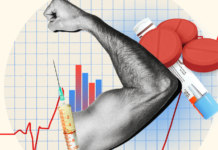Testosterone—you know it, you love it, you can’t get enough of it. It helps you set PRs, keeps muscle on your body, and makes you more virile. At least that’s mostly true. It’s also true that testosterone, especially low testosterone, is misunderstood.
So we asked an expert for clarity. Dr. Faysal Yafi, M.D., F.R.C.S.C., the Director of Men’s Health and Newport Urology and Chief, Division of Health AI Expert and Reconstructive Urology at the University of California, Irvine (that’s a lot of accolades, so listen up) chatted with us about what testosterone is, how to make the most of it, and what to do as we start to age—and it starts to dip. Here are four key takeaways.
Your T-levels are highest in the morning
Want to make the most of your testosterone? Become a morning person.
“Testosterone follows the circadian—or basically the sleep—rhythm,” says Dr. Yafi. “Testosterone levels are highest in the early in the morning, between 7:00 and 10:00, and lowest in the evening.”
To take advantage of your boosted testosterone for a workout, a special moment with the S.O., or even to focus on a big project, make sure your mornings are clear.
“The high levels early in the morning may be more conducive to better workouts and a bit more focus for many men—some more drive when someone’s trying to get things done.” says Dr. Yafi.
Testosterone affects your brain and body
While we may associate solid levels of testosterone with muscle growth and libido, it has implications for more than just physical wellbeing. “There’s a lot of literature suggesting an association between low testosterone and depression and other mood disorders, and even early onset memory loss and dementia,” says Dr. Yafi, “as well as what we call a foggy brain—difficulty concentrating and getting motivated.”
Dr. Yafi often sees low-T patients in his practice reap mental wellness benefits as their testosterone therapy progresses. “They have more drive and they’re more focused,” he says. “Maybe they have better memory recall. We see this in the clinic all the time.”
There are several types of testosterone
There’s testosterone for men and estrogen for women and those are the two big hormones, right?
Not quite.
Dr. Yafi explains that there are actually three kinds of testosterone. First, there’s free testosterone, which is readily available for cells to use. The other two types of testosterone (and most of the testosterone in your blood) are attached to proteins in the blood called albumin and sex hormone-binding globulin (SHBG), respectively. In addition to free testosterone, albumin-bound testosterone is also available for the body to use; these two types of testosterone are known as bioavailable testosterone.
The third type—the testosterone attached to SHBG proteins—is not available for use. Dr. Yafi says that SHBG increases as men get older, and so, too, does their SHBG-attached testosterone.
All of which is to say that it’s useful to get a blood test that measures free and total testosterone levels.
Testosterone replacement therapy isn’t steroids
Steroids are illegal to use without a prescription, so a lot of guys associate “testosterone replacement therapy” with those iconic locker room injections. But they’re not the same thing.
“Testosterone replacement means increasing testosterone from low to normal levels,” says Dr. Yafi, “as you would for people who have low thyroid hormone, or diabetics who have low insulin—bring them to normal levels.”
In anabolic steroid abuse, people with normal testosterone levels supplement with steroids and bring their testosterone over the top. But if you’ve got low testosterone, then replacement therapy may actually improve your quality of life, says Dr. Yafi. And a bonus? “Testosterone replacement therapy, when done in a clinical, appropriate way is extremely safe.”























